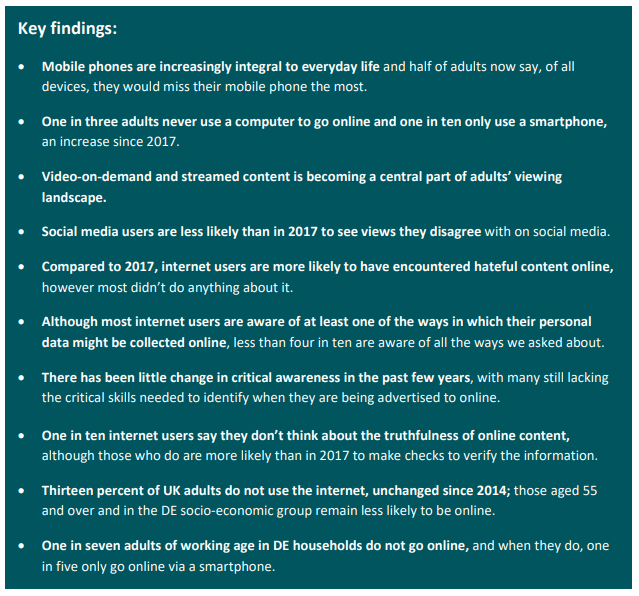The week’s posts on a single page (most recent at the top):
The State of Things
Ofcom recently published its annual study of UK adults’ media use and attitudes, Adults: Media use and attitudes report 2019.


Two things (among many) from elsewhere in the report that strike me as needing urgent attention:
Newer users tend to be less likely than established users to possess critical awareness of media and online services. For example, they are less likely to be aware that the results returned by search engines may contain inaccurate or biased information (38% vs. 60% for established users).
In order to understand the barriers to takeup, we ask those who do not use the internet their reasons for not going online; more than half say they do not see the need or “it’s not for people like me” or they are not interested. Just over one in five mention a reason for non-use relating to it “being too complicated” while 15% mention a cost-related reason.
Legacy
I can’t remember the first time I heard the word legacy but I heard it a lot, as I grew up, in the context of the Olympic Games through my dad’s work for Reuters and the IOC.
Nor can I remember ever looking up the definition.
Instead, it probably found its way into my subconscious over a number of years, because legacy is now as important to me as it is to the IOC, who want every Olympic Games to leave a strong, positive, lasting impact on their host city and nation.
Following a bit of a painful relationship with my dad, who died in 2008, legacy has become even more important to me, as a parent. I want my kids to know about me and my work so that if they choose to do something similar when they’re older, they’ll be better equipped to make big decisions than I was.
A few years ago, I promoted an idea I called ‘legacy blogs’ – a place for parents to write things that might benefit their kids. I suppose this is mine.
Mirrors
Yesterday I wrote about a great tool for identifying colours digitally so that you can mirror them elsewhere, online or off.
How does it work?
When you use Instant Eye Dropper it gives you what’s called a six-character hex code (click here for a definition), which may include letters and/or numbers, such as #FFFFFF (white) or #000000 (black).
Then take that hex code and use it to apply that exact colour wherever you need it.
Bullet the Blue Sky
There’s a great little free tool available for when you want to replicate a colour online.
For example, if you’ve created a website for your new business and you want to create flyers or business cards to match that site exactly, I recommend Instant Eye Dropper.
Download it and use it to find the hex code of the colour you want to use elsewhere.
Think
When you’re starting a new project or launching a new business, it’s a good idea to think about the logical order of what needs to be done.
For example, that means checking to see if the domain name you want to use is actually available before you commit to that name to your flyer and business cards.
And it means making sure your new website is up and running before you start handing out those flyers and cards because the first thing people will do is look up your site, and if it’s not ready you might have a hard job convincing them to use you when it is.
It’s easy to let your enthusiasm and excitement get in the way of logical thought.
Let’s Go Surfing
In order to be ‘live’ on the internet, a website needs a home (a hosting server). Lots of companies provide hosting, some good, some less so; some are cheap, some are dirt cheap; and some are free.
I always use Hostgator*: they’re inexpensive, reliable and offer decent customer service.
Two of the most common types of hosting are:
- Shared hosting means your site sits on a server with many others and is very cost-effective. It’s the most common and adequate for all but the largest sites or those with a greater need for water-tight security (for processing credit card payments, for example).
- Dedicated hosting is when a single website is hosted on a server. This is a much more expensive option
*affiliate link
Dead End Street
When a reader gets to the bottom of your webpage, what do they see? What do you want them to do?
It could be any of these:
- Click for more details
- Buy something
- Sign up to your newsletter
- Claim their free offer
- Read your next article
- Follow you on social media
Whatever you want them to do, give them a call to action. Tell your reader exactly what you want them to do. Avoid letting people get to the end of your page and finding nothing but a dead end.
>>>Playlist<<<
[et_bloom_inline optin_id=optin_13]

